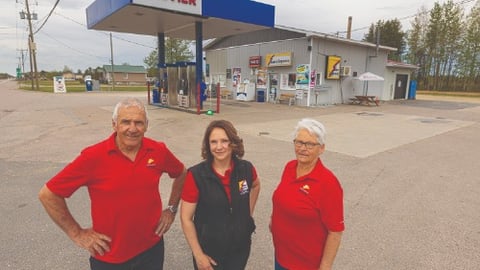CSNC EXCLUSIVE: Planning for the unexpected
When Mélanie Mainville and her business partner Karl Payeur bought four Dépanneur Voisin (Sobeys) c-stores in Lourdes-de-Joliette, Quebec from their previous boss in 2021, they were excited about their new venture.
But two weeks after taking possession of the stores, Mainville’s doctor delivered some shocking news: A mass in her chest she’d had removed six months earlier was diagnosed as an aggressive desmoid tumor. Although it was benign, she underwent a month of chemotherapy treatment to prevent it from returning.
“When the chemo stopped working three months later, I had an 11-hour emergency surgery to remove the tumor and affected ribs, then weeks of bed rest,” recalls Mainville, who is a 2023 Future Leaders in Convenience + Car Wash winner.
READ: Profile of FLICC winners Mélanie Mainville and Karl Payeur
“For the next two years, I juggled our business in between many doctor’s appointments. Without the help of Karl and our team, I wouldn’t have made it. Everyone supported me, and I’ll never forget that. Unfortunately, that operation didn’t work; the tumor is back, and I’m waiting for my next surgery.”
Running a c-store business is often a seven-day-a-week endeavour, and many owners are so busy they don’t stop to wonder what would happen if they or their loved one were struck by critical illness or accident. If you’re incapacitated and there’s no contingency or succession plan in place, your business and the well-being of your employees can suffer.
Scrambling to implement a game plan when faced with an emergency or a health crisis can be overwhelming. We asked experts across Canada how you can protect your business now.
Start with smart systems
The Canadian Federation of Independent Business recently published a report showing small business owners work an average of 59 hours a week to fill gaps due to the ongoing labour shortage. And only 6% of respondents were automating their processes to compensate for these shortfalls.
That’s a recipe for chaos, says Beverlee Rasmussen, a certified systems business coach in Langley, British Columbia and author of Small Business Big Opportunity. Rasmussen notes that while tactical business owners bail water out of a sinking boat every day in a state of panic, strategic business owners pull the boat out of the water and fix the holes. Having a systems-based mindset allows you to pull a sinking boat out of the water if you fall ill.
“A system is simply the way something happens. Without formal systems, every action in your business is decided by you or your employees in the heat of the moment,” says Rasmussen. “Systems thinking reframes every problem in your organization as an opportunity for improvement.”
Because many c-stores start small without any documentation, owner/operators do everything and hold most of the operational knowledge. Putting a contingency plan in place means someone else can quickly take over in an emergency, says Rasmussen. Begin by asking: What systems are already in place and what needs your attention?
“You need an operating manual and procedures in case you need to step away. Write down what’s working so someone else can come in and take that over,” suggests Rasmussen. “In the past, owners would’ve rolled their eyes and said, ‘It's going to take me months to write it down’, but now with artificial intelligence, you can feed the basic premise of how to merchandise your candy into ChatGPT and it'll give you the step-by-step process, which you can then revise.”
Write everything down in a spreadsheet or a notebook, she adds. How do you want the store to operate? How do you want clients to feel when they come in? What would be devastating if you didn't have it on the shelf? What’s your return policy?
“Add in all your supplier systems, your customer service systems, your cleanliness and restocking systems—everything that happens whether you’re there or not,” says Rasmussen.
Ditto for your training systems because there’s no point having a manual on the shelf if your employees don't know how to use it.
“Your team can help you write procedures because they're in the trenches with you and can make checklists like ‘Here’s how to cash out’ and ‘How to open the store’,” she adds.
Build your contingency plan into your business plan, and list who will be responsible for management decisions while you’re away. Sensitive information about legal agreements or finances can be kept in a password-protected file that only one or two trusted employees can access.
Create a contact list of repair people and suppliers, how much you regularly order and what terms have been negotiated, and keep that information in a convenient location, advises Rasmussen.
Ensure you have the right insurance coverage
C-store owners might not realize that their commercial liability insurance policy won’t cover them if they’re injured or ill, or if they take a leave of absence to care for a sick relative. Depending on where you live, workers’ compensation won’t cover you if you’re the sole proprietor, so if you fall off a ladder or have a car accident, you can’t make a claim.
“While a commercial liability policy is great to cover stock, operations, theft, fire and lawsuits, it doesn't actually cover the self,” explains Brandon Bowie, team lead in the property and hospitality space at Zensurance, which is based in Toronto.
“So, in a mom-and-pop shop where the owners are incredibly important to the business, you must cover the owners as well. Commercial policies can cover lost income due to a fire or total loss of property, but it can't cover loss of time or loss due to personal sickness.”
That’s why experts advise purchasing a ‘key person’ policy in tandem to your commercial one that will cover you, your spouse—if they work with you—and any employees vital to your business. This type of insurance covers short- and long-term disability, so you’ll be paid while you recover.
“Disability insurance is more important than life insurance for a small business owner to cover their bills,” adds Leslie Gardner, a certified financial planner in Lantzville, B.C.
Ask lots of questions when buying insurance to make sure you understand what’s covered.
“Two convenience store owners could have completely different packages, depending on what they think they need to be covered for, what their risks are, and what they sell,” says Bowie.
Figure out the financials
If you’re incapacitated, do you have the cashflow to make payroll and pay vendors? Gardner’s first step is checking how the business runs so operations can continue even if you’re not there.
“Where's the money coming from? The biggest mistake I see is everybody spends the tax money, and you can't spend that tax money. The minute your business income arrives in your bank account, set aside the tax money and then work with the rest,” she advises.
Speaking of taxes, being in the hospital doesn’t get you off the hook for filing business or personal taxes, so it’s wise to file a taxpayer relief request form with the Canada Revenue Agency and your provincial tax department, suggests Brendan Rolfe, senior manager of business resources for Western Canada for the CFIB.
“If I’m getting cancer treatments and can't focus on my business, I can ask for relief from filing those payments and from the interest and penalties that would normally be associated with late remittance,” he says.
Since most business owners aren’t eligible to collect employment insurance even if they're paying into it, you can proactively register for EI for self-employed workers, depending on where you live, adds Rolfe.
Go with a pro to get the best business advice
It’s daunting to figure out everything on your own, so reach out for help when you need it, says Rolfe, whose team advises small business owners and offers HR, WCB, human rights and tax support services to its membership of about 100,000 businesses across the country.
Rolf sees many business owners with an emergency plan in case of fire or flood, but nothing for injury or illness. First, choose someone to take over if you’re not there.
“I recommend a succession or continuity plan. In HR, we call this ‘building your bench’: If I get sick or injured, who's going to run the business while I recover?” says Rolfe.
“It should be somebody you trust without question to do what's right for your business and make the right decisions. I always recommend training and keeping an eye out for strong workers.”
Take your time, but get started now
You might need several weeks or months to organize important information and train employees to take over if necessary. Rasmussen suggests carving out five hours a week to work on your contingency plan.
There’s no need to start from scratch; the Business Development Bank outlines an eight-step continuity plan on its website. Many banks and insurance companies provide similar guides. If you’re a franchisee, ask your parent company for guidance.
The CFIB offers free resources to its members including Building a Succession Plan that can serve as a checklist, along with about 200 business templates covering everything from emergency disaster planning to continuity planning.
“Plug in your information, and we'll review it with you and add any contingencies you didn't think of,” says Rolfe. “Your job is to run your business, but our job is to know everything about running the business to make our members' lives easier.”
Once you have a contingency plan, loop in your tax planning accountant, attorney, insurance agent and banker. Remember to update your plan regularly. By adopting a proactive approach to your business, you can quickly get things under control and focus on recovery.
This article originally appeared in the Jan/Feb 2024 issue of Convenience Store News Canada



